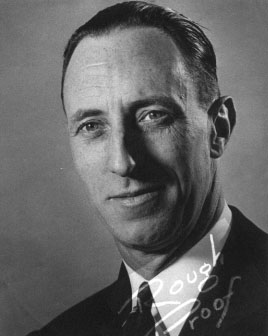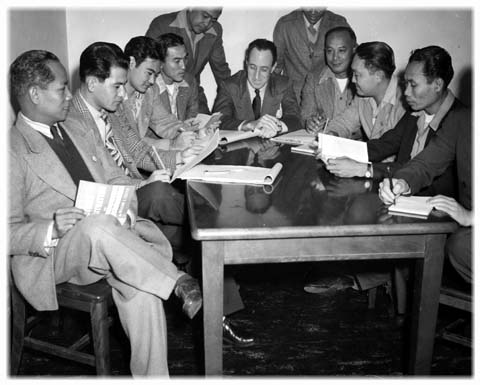We'd like to hear from you.
Phone line
Mon to Fri 8:00am-4:00pm
Working hours
451 Atkinson Dr
Honolulu, HI 96814
Honolulu, HI 96814
Visit us
AN INJURY TO ONE IS AN INJURY TO ALL
451 Atkinson Dr Honolulu, HI 96814
ILWU Leaders
Harry Bridges Jack Hall Harry Kamoku

Harry Bridges was an Australian-born American labor leader who became a central figure in the American labor movement. Born in 1901, he moved to the United States in the 1920s and soon became involved in organizing waterfront workers in San Francisco. Bridges was instrumental in founding the International Longshoremen's and Warehousemen's Union (ILWU) in 1937, where he served as president until 1977. Known for his radical views, Bridges was a staunch advocate for workers' rights and social justice, earning both admiration and controversy throughout his career. His leadership was marked by a commitment to democratizing the labor movement and empowering rank-and-file workers. Harry Bridges
Harry Bridges' Philosophy of Unionism
Harry Bridges believed in a militant, inclusive, and democratic form of unionism. His vision for the ILWU was rooted in the idea that workers should have direct control over their unions and that the union should be a vehicle not just for better wages and working conditions, but also for broader social change. Bridges was adamant that the union should be racially integrated and inclusive of all workers, regardless of skill level, race, or nationality. He advocated for strong solidarity among workers across different industries and was committed to internationalism, believing that the struggle of workers was interconnected across borders. His philosophy emphasized the importance of collective action and direct participation in decision-making processes, which helped shape the ILWU into a powerful, democratic organization.
Harry Bridges in Hawai'i
During his tenure as the leader of the ILWU, Harry Bridges played a pivotal role in the labor movement in Hawai'i. He was deeply involved in the organizing efforts that transformed the islands' labor landscape, particularly in the sugar and pineapple industries. Bridges supported the efforts to unionize plantation workers, many of whom were of Asian and Pacific Islander descent, and he worked to unify these workers under the ILWU banner. His commitment to racial equality and worker solidarity resonated strongly in Hawai'i, where the union became a powerful force for change. Bridges frequently visited the islands, meeting with workers, strategizing with local union leaders, and lending his support to strikes and other labor actions. His leadership helped establish the ILWU as a major influence in Hawai'i's labor and political arenas, fostering a legacy of strong, progressive unionism that continues to impact the state to this day.
Jack Hall: A Founding Father of ILWU in Hawai'i

STAR-BULLETIN / 1951 Jack W. Hall, Hawaii regional director for the ILWU, right, met with West Coast union negotiators Henry Schmidt, left, and J.R. Robertson during the longshoremen’s 1951 biennial convention in Honolulu. Schmidt directed the 1949 Hawaii dock strike.
Jack Hall was a prominent American labor leader who played a critical role in establishing the ILWU in Hawai'i. Born in Pennsylvania in 1915, Hall moved to Hawai'i in the late 1930s, where he quickly became involved in the labor movement. He is best known for his work organizing plantation workers in Hawai'i's sugar and pineapple industries, where he sought to unite a diverse workforce under the ILWU. As the union’s Regional Director in Hawai'i, Hall's leadership was instrumental in transforming the islands' labor landscape, leading to significant improvements in wages, working conditions, and rights for thousands of workers. Hall's legacy in Hawai'i is one of dedication to labor rights, social justice, and the empowerment of working people. Jack Hall
Jack Hall's Philosophy of Unionism
Jack Hall's approach to unionism was deeply influenced by the principles of inclusivity, solidarity, and social justice. Like Harry Bridges, Hall believed in the power of uniting workers across racial and ethnic lines, which was particularly significant in Hawai'i's multicultural society. He understood that the strength of the labor movement depended on the ability of workers from diverse backgrounds to come together in pursuit of common goals. Hall was a staunch advocate for democratic decision-making within the union, ensuring that the voices of rank-and-file members were heard and respected. He also emphasized the importance of strong, militant action in achieving workers' rights, including organizing strikes and other direct actions when necessary. Hall’s philosophy of unionism was grounded in the belief that labor unions should not only fight for better wages and working conditions but also serve as a force for broader social change.
Jack Hall and the ILWU in Hawai'i
Jack Hall’s involvement with the ILWU in Hawai'i was marked by his tireless efforts to organize and advocate for the islands' workers. He was at the forefront of the unionization efforts in Hawai'i's sugar and pineapple plantations, where he faced significant opposition from powerful plantation owners and the territorial government. Despite these challenges, Hall successfully organized thousands of workers, many of whom were immigrants and descendants of immigrants from Asia and the Pacific. His leadership was pivotal during the 1946 sugar strike, one of the largest and most significant labor actions in Hawai'i’s history, which led to substantial gains for plantation workers. Hall also played a key role in expanding the ILWU’s influence in Hawai'i beyond the plantations, helping to organize workers in other industries such as shipping, hotels, and tourism. Throughout his tenure, Hall maintained a close connection with the workers he represented, frequently visiting them on the job, listening to their concerns, and involving them in the decision-making process. His work helped solidify the ILWU’s presence in Hawai'i, making it one of the most powerful and respected unions in the state.
Harry Kamoku: An Early ILWU Leader in Hawai'i

Harry Kamoku, (third from right) with ILWU founder Harry Bridges (center) at the 1946 California Labor School held for ILWU leaders.
Harry Kamoku was a pioneering labor leader in Hawai'i who played a crucial role in the early days of the ILWU in the islands. Born in 1901 in Hawai'i, Kamoku was of Native Hawaiian descent and emerged as a key figure in the labor movement during a time when workers, especially those of Hawaiian, Asian, and other immigrant backgrounds, faced significant exploitation. Kamoku is best known for his efforts in organizing dockworkers in Hawai'i, leading them through some of the most challenging periods of labor struggle. His leadership and dedication to workers' rights were instrumental in laying the foundation for the ILWU's strength and influence in Hawai'i. Harry Kamoku
From Hawaiʻi to San Francisco to Hawaiʻi
Kamoku and other Native Hawaiian stevedores participated in the 1934 West Coast Waterfront Strike, a pivotal event in American labor history. As members of the diverse workforce employed on the docks of West Coast ports, including those in San Francisco, many Native Hawaiians stood in solidarity with their fellow longshoremen in the fight for better wages, working conditions, and union recognition. They had a reputation for chasing down and beating up scabs. Following the historic strike, Harry Bridges founded the ILWU to organize workers under bottom-up democratic unionism. Seeing the power of unity and solidarity under this model in the West Coast waterfront strike, Harry Kamoku reached out to Harry Bridges to affiliate the Hawai’i dockworkers with the ILWU the year it was founded - 1937.
Harry Kamoku and the 1938 Hilo Massacre
Harry Kamoku was a key figure in the events leading up to and during the 1938 Hilo Massacre, a pivotal moment in Hawai'i's labor history. As a leader of the longshoremen and an advocate for workers' rights, Kamoku was deeply involved in organizing the strike that culminated in the Hilo Massacre. On August 1, 1938, striking dockworkers and their supporters, including members of various labor unions and community groups, gathered in Hilo to protest the arrival of a ship that was being unloaded by non-union workers, undermining the strike.
Kamoku, alongside other union leaders, helped organize the peaceful protest, which aimed to assert the rights of workers and demand fair treatment. However, the protest was met with violent resistance from police forces, who opened fire on the unarmed demonstrators, injuring 50 people in what became known as the "Hilo Massacre" or "Bloody Monday." Kamoku himself was present during the protest and was among those who were targeted by the police. Despite the brutality of the response, Kamoku's leadership and commitment to non-violent resistance were crucial in maintaining the protest's focus on labor rights and social justice.
The Hilo Massacre marked a turning point in Hawai'i's labor movement, highlighting the deep divisions between workers and the powerful interests that opposed them. Kamoku's role in the event cemented his reputation as a courageous and dedicated labor leader, willing to stand up against significant odds for the rights of Hawai'i's workers. The massacre also galvanized support for the ILWU and other labor organizations, ultimately contributing to the growth and strength of the labor movement in Hawai'i in the years that followed.
